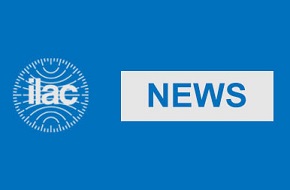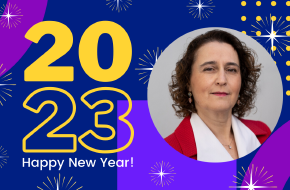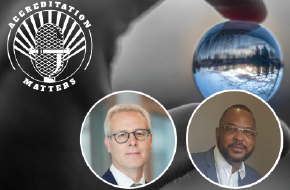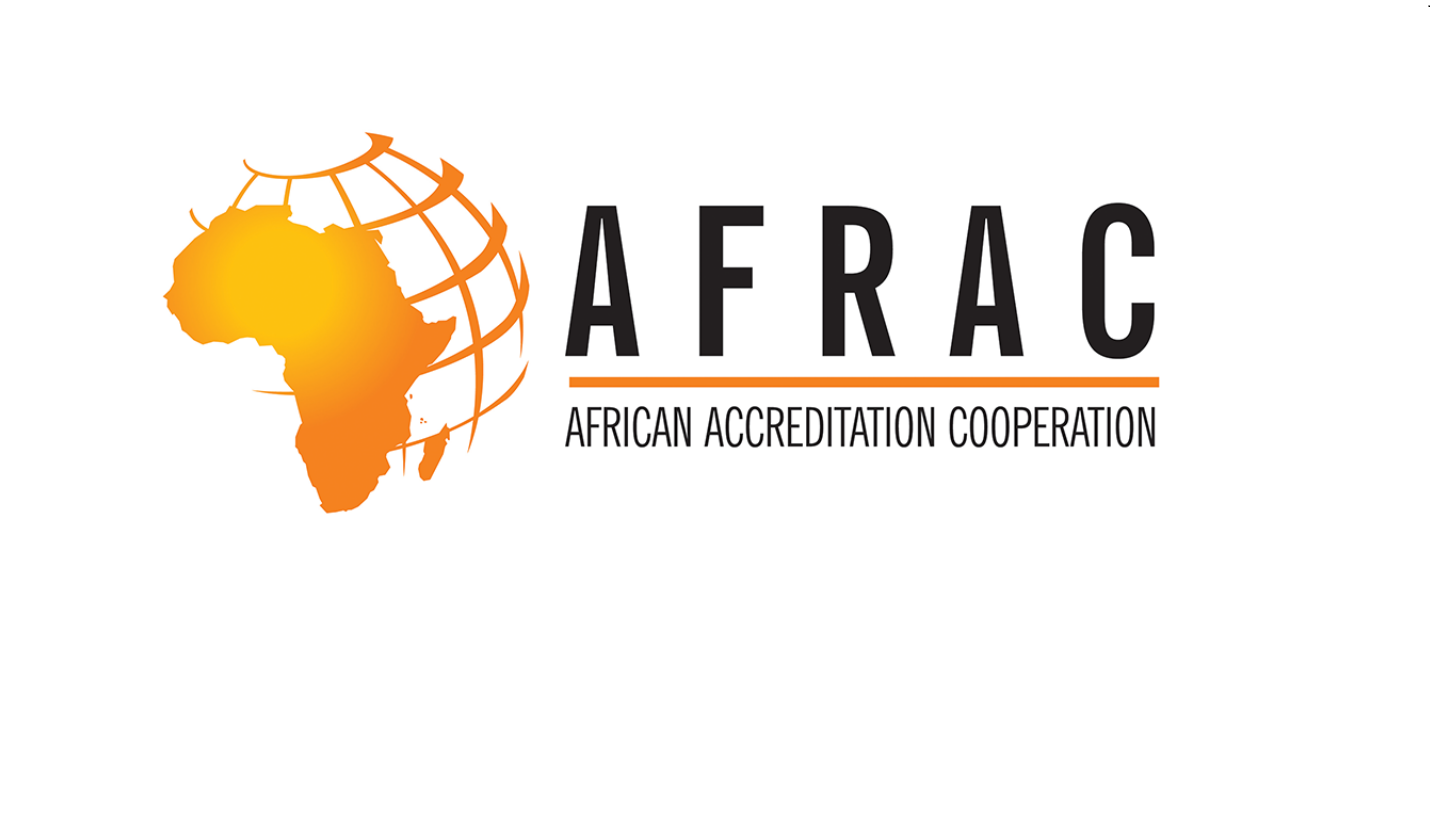
The signatory status of International Accreditation Service, Inc (IAS), USA, to the ILAC MRA has been extended to include Medical Testing (ISO 15189).
The full list of signatories to the ILAC MRA is available from https://ilac.org/signatory-search/ .

The signatory status of the Accreditation Education Research and Scientific Services Center Pvt. Ltd (AERSSC), Nepal to the ILAC MRA was suspended on 3rd January 2023. This suspension to the ILAC MRA is a result of the suspension of AERSSC from the APAC MRA and in accordance with IAF/ILAC A2 Annex 7.

Happy New Year, I am looking forward to 2023 being a year of successful processes and good controls for our decisions that will benefit all ILAC members, partners and interested regulators.
In the past year, despite being a challenging year that required all of us to continue working with a new normal, including conducting our activities online, we managed to fulfill all our plans and even beyond.
The ILAC set of policy documents and internal work procedures that bind all of us as members continue to be managed and implemented in an exceptional way by the ILAC secretariat, the committee Chairs and members and the ILAC Executive.
The work of the IAF/ILAC Steering Committee continues on our mega project, one international organisation for accreditation, with the issue of stakeholder voting rights currently being considered via ballot and the tender for the Secretariat being drafted.
Applications for the recognition of the accreditation of Biobanks from the regions are now being accepted following the publication of ILAC P4, P5 and R6. This evaluation of applicant regional cooperations for this scope is the final stage in the process for extending the ILAC MRA to include the accreditation of biobanks.
ILAC and IAF reviewed and re-signed the MoU with The International Telecommunications Union (ITU), supporting and strengthening our commitment to cooperation and collaboration to the ongoing development of ITU-T’s Conformity and Interoperability (C&I) programme.
ILAC also signed the Joint Statement of Intent On the Digital Transformation in the International Scientific and Quality Infrastructure.
In 2022 we again held a competition for the design of the World Accreditation Day (WAD) poster, again took our WAD event online and saw excellent engagement and launched a joint podcast series.
Finally for 2022, the latest edition of ISO 15189 was published, so all ABs that accredit Medical Labs, now have 3-year implementation period (i.e. until Dec 2025) to ensure accredited medical laboratories comply with this latest edition of the standard.
The year ahead will be challenging and brings with it a variety of activities and face-to-face meetings following three years of on-line only meetings. 2023 will see us consider and require us to make significant decisions to maintain our standing in the world as an international accreditation organization with the tagline ‘accredited once, accept everywhere’. In making these decisions we must maintain the trust of all our stakeholders and international organizations with whom we have mutual recognition agreements. Above all, we will continue to improve the work and cooperation between us, the members of ILAC, and those that wish to join, in a professional manner and respecting the decisions made by all members.
Happy new year, prosperity, fulfillment, and success.

We welcome Quality and Accreditation Institute, Centre for Laboratory Accreditation (QAI CLA), India, as a Full Member of ILAC.
As QAI CLA is a signatory to the APAC MRA for the accreditation of testing laboratories using ISO/IEC 17025 and medical testing laboratories using ISO 15189, QAI CLA has been granted signatory status to the ILAC MRA and therefore, Full membership of ILAC.
We welcome QAI CLA and look forward to working with our QAI CLA colleagues.
The full list of signatories to the ILAC MRA is available here.

ILAC-G24:2022 – Guidelines for the determination of recalibration intervals of measuring equipment has been published and is now available from https://ilac.org/publications-and-resources/ilac-guidance-series/

IAF and ILAC have released the third episode of Accreditation Matters, our podcast featuring discussions with international experts on important matters to the international quality infrastructure community and the way that accreditation supports regulators, global trade and consumers.
In this episode, IAF CABAC Chair Marcus Long (IIOC) interviews IAF UAC Vice-Chair Sheronda Jeffries (TIA QuEST Forum) and Professor Pavel Castka (University of Canterbury) about the role of technology in delivering trustworthy, effective, and valuable accredited conformity assessment. They discuss topics including the impact of COVID-19 on the conformity assessment community, views on digitalization and remote audits and assessments, new technologies, and the opportunities and challenges of digital transformation.
Listen to the episode now on Spotify, Apple Podcast, Google Podcasts or Amazon Music, or watch it on YouTube.

We are pleased to advise that ISO 15189:2022 Medical Laboratories – Requirements for quality and competence has now been published.
Further a resolution was endorsed at the ILAC General Assembly held last month to allow a 3-year implementation period from the date of publication of this revised standard (ie now December 2025) as shown below:
ILAC Resolution GA 26.08
As the revised version of ISO 15189 is scheduled for publication in 2022 or early 2023, the General Assembly endorses the recommendation of the AIC that a transition period of 3 years from the date of publication be adopted.
Noting that the requirements for Point of Care Testing (POCT) contained in ISO 22870:2016 have been incorporated into the revised ISO 15189, ISO 22870:2016 in conjunction with ISO15189:2012 will still be recognised as a Level 4 standard for POCT for the duration of the transition period.
At the end of the transition period, accreditation of a medical laboratory to ISO 15189:2012 and accreditation of POCT to ISO 22870:2016 in conjunction with ISO15189:2012 will not be recognised under the ILAC Arrangement.
The implementation of this transition period for ISO 15189:2022 by the signatories to the ILAC MRA for the accreditation of medical laboratories will be monitored by the ILAC AMC to ensure the deadline is achieved. The process used by the AMC to monitor this implementation of the revised standard will be similar to that used during the implementation of ISO/IEC 17025:2017
We would also like to take this opportunity to thank Erik Oehlenschlaeger, ILAC AIC Chair, the members of the AIC ISO 15189 working group and our liaison officers to the ISO WG responsible for this standard for their contributions on behalf of ILAC to the revision of this important standard for our accreditation body members and their accredited medical laboratories.

IAF and ILAC have released the second episode of our new podcast, Accreditation Matters, which features discussions with international experts on important matters to the international quality infrastructure community and the way that accreditation supports regulators, global trade and consumers.
In this episode, Rebecca Sheehan of the ILAC Secretariat interviews IAF Chair Emanuele Riva (Accredia) and AFRAC Chair Ron Josias (SANAS) on the role of accreditation and accredited conformity assessment in supporting environmental, social and governance (ESG) declarations. Mr. Riva and Mr. Josias discuss topics including the importance of ESG criteria, how accreditation can combat greenwashing and support human health, international collaboration in this area, and the value of IAF CertSearch.
Listen to the episode now on Spotify, Apple Podcast, Google Podcasts or Amazon Music, or watch it on YouTube.

Further to the announcement earlier this month regarding the continuation of the recognition for the African Accreditation Cooperation (AFRAC) as a recognised regional cooperation body of ILAC, we are now pleased to also announce the implementation of the extension of the recognition of the AFRAC MLA to the ILAC MRA to include the accreditation of RMP and PTP as noted in the Arrangement Council decision below. The effective date for these extensions is 8 November 2022.
“The ILAC AMC recommends that recognition of the AFRAC MLA to the ILAC MRA should be continued for calibration and testing (ISO/IEC 17025) and medical testing (ISO 15189) laboratory and inspection body (ISO/IEC 17020) accreditation schemes.
In addition, it is recommended that the recognition of the AFRAC MLA to the ILAC MRA should be extended to include the accreditation of RMP (ISO 17034) and PTP (ISO/IEC 17043) however the effective date for the implementation of these extensions will be deferred until the AFRAC MLA has been extended to include the accreditation of PTP and RMP.
It is recommended that the next re-evaluation of AFRAC be scheduled for 4 years and therefore should commence no later than February 2025.”
Information on the recognised regions including AFRAC to the ILAC MRA is available from https://ilac.org/ilac-mra-and-signatories/recognised-regional-cooperation-bodies/
We look forward to continuing to work with our colleagues from AFRAC.